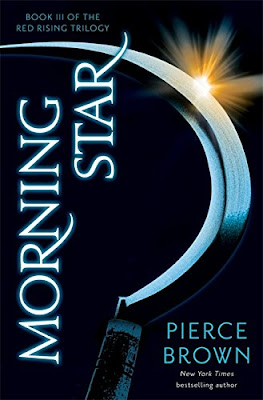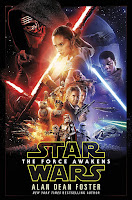I rise into darkness, away from the garden they watered with the blood of my friends. The Golden man who killed my wife lies dead beside me on the cold metal deck, life snuffed out by his own son’s hand.
Autumn wind whips my hair. The ship rumbles beneath. In the distance, friction flames shred the night with brilliant orange. The Telemanuses descending from orbit to rescue me. Better that they do not. Better to let the darkness have me and allow the vultures to squabble over my paralyzed body.
My enemy’s voices echo behind me. Towering demons with the faces of angels. The smallest of them bends. Stroking my head as he looks down at his dead father.
“This is always how the story would end,” he says to me. “Not with your screams. Not with your rage. But with your silence.”
***
Pierce Brown has several times cited Star Wars—specifically the original trilogy—as a influence of no small significance on the fan-favourite series Morning Star completes, and it's fair to say the pair share a double helix here and a structural strand there.
Like A New Hope before it, Red Rising introduced an almost recognisable galaxy ruled by an evil empire; an evil empire whose merciless machinations gave the saga's protagonist—here, the Helldiver Darrow—a very personal reason to rebel against said. It was a bloody good book, to be sure, but as nothing next to Golden Son, which scaled up the conflict and the cast of characters introduced in Red Rising marvelously, in much the same way The Empire Strikes Back improved in every conceivable sense on its predecessor. It also ended with a catastrophic cliffhanger... which we'll get back to.
In short, it shouldn't be such a surprise that the pattern which held true in books one and two of Brown's breakthrough also applies to the conclusion. For better or for worse, Morning Star is this trilogy's Return of the Jedi—though there are, thankfully, no Ewok equivalents in evidence.
The end begins with Darrow locked in a box.
Time, to wit, has lost all meaning to the Reaper, but he's been in this almost-but-not-quite-carbonite contraption for nearly a year. In the process the young man who freed Mars has lost much of his mind, and all of the carefully-carved body that helped him pass for a Gold in the colour-coordinated caste hierarchy of the sinister Society. He's so far gone, in fact, that he's seriously considering killing himself when a duo of deeply-embedded rebels finally spring him from the Jackal's base of operations.
Darrow may be back in play from this point on, but Brown is smart not to simply dismiss Golden Son's devastating denouement. The Reaper, returned, is no longer a leader. He has to be carved all over again, and retrained as if here were a new recruit to the cause. "Like a prisoner who spend his whole life digging through the wall, only to break through and find he's dug into another cell," (p.70) he feels beaten, defeated—which is understandable, because he was.
He's become "a shivering fallen warlord staring down at a darkened city, hoping against everything that he can go home." (p.42)
Sevro, who has run the Sons of Ares since Darrow's disappearance, gives him the chance to do exactly that, in an attempt to remind his devastated friend what he's sacrificed so much for—and though the visit does reinvigorate him, when he sees what has become of the thousands he helped free previously, it also redoubles Darrow's deepest doubts:
In addition to dashing Darrow's character with a more sophisticated conflict than those he's put to bed before, the prospect of this colossal problem underlies the entirety of Morning Star's narrative, grounding and giving deeper meaning to what could otherwise have come across as a succession of set-pieces in service of "one of the greatest military victories in modern history" (p.387)—and that's just a prelude, readers.
In the meantime, Morning Star gives Sevro, the Han Solo of Brown's books, and Mustang—Leia to Darrow's Luke—markedly more memorable roles than either has had before, in large part because although the cast is still vast, there've been quite a few casualties over the course of the series so far, and with fewer faces, those that remain come into finer focus. Unfortunately, this leads to new additions like Holiday—one of the undercover Sons who saved Darrow from the Jackal at the start—looking undercooked.
Morning Star slightly misses the mark in several other respects as well. It's surprisingly slow to start, to the extent that you get the sense Brown wrote himself into something of a corner in the last bit of book two. Add to that the fact that it's practically impenetrable. Not only need new readers not apply, but unless you're coming straight from Golden Son, a lengthy refresher session with said text is necessary.
And there are, at the last, too few of "the fragile moments that hang crystalline in time and make life worth living" (p.439) that Darrow imagines before the final fight. Indeed, Brown seems ill-at-ease with scenes that fail to feature either an explosion or a betrayal, though he really needn't be, as in practice these pauses are among the most precious components of the whole story.
But you won't catch me complaining about the kick-ass action that serves to draw the trilogy's many threads together instead. Between the high-pitched hum of the razors our heroes wield and the subsonic thumping of the opposition's PulseFists, the impactful battles that make up most of Morning Star are damn near operatic.
Morning Star mightn't be the revelation its incredible predecessor represented, but as an ending, it absolutely satisfies. Our central characters arrive at a destination that seems, in retrospect, inevitable, and there, a situation that's been building since the very beginning of what has been an exhilarating trilogy is roundly resolved. And the Red Rising series, I'll say, does diverge from the landmark movies that have been such an influence on it in at least one key respect: come the conclusion, there isn't a silly song in sight.
Like A New Hope before it, Red Rising introduced an almost recognisable galaxy ruled by an evil empire; an evil empire whose merciless machinations gave the saga's protagonist—here, the Helldiver Darrow—a very personal reason to rebel against said. It was a bloody good book, to be sure, but as nothing next to Golden Son, which scaled up the conflict and the cast of characters introduced in Red Rising marvelously, in much the same way The Empire Strikes Back improved in every conceivable sense on its predecessor. It also ended with a catastrophic cliffhanger... which we'll get back to.
In short, it shouldn't be such a surprise that the pattern which held true in books one and two of Brown's breakthrough also applies to the conclusion. For better or for worse, Morning Star is this trilogy's Return of the Jedi—though there are, thankfully, no Ewok equivalents in evidence.
The end begins with Darrow locked in a box.
Time, to wit, has lost all meaning to the Reaper, but he's been in this almost-but-not-quite-carbonite contraption for nearly a year. In the process the young man who freed Mars has lost much of his mind, and all of the carefully-carved body that helped him pass for a Gold in the colour-coordinated caste hierarchy of the sinister Society. He's so far gone, in fact, that he's seriously considering killing himself when a duo of deeply-embedded rebels finally spring him from the Jackal's base of operations.
Darrow may be back in play from this point on, but Brown is smart not to simply dismiss Golden Son's devastating denouement. The Reaper, returned, is no longer a leader. He has to be carved all over again, and retrained as if here were a new recruit to the cause. "Like a prisoner who spend his whole life digging through the wall, only to break through and find he's dug into another cell," (p.70) he feels beaten, defeated—which is understandable, because he was.
He's become "a shivering fallen warlord staring down at a darkened city, hoping against everything that he can go home." (p.42)
Sevro, who has run the Sons of Ares since Darrow's disappearance, gives him the chance to do exactly that, in an attempt to remind his devastated friend what he's sacrificed so much for—and though the visit does reinvigorate him, when he sees what has become of the thousands he helped free previously, it also redoubles Darrow's deepest doubts:
In my youth, I thought I would destroy the Society. Dismantle its customs. Shatter the chains and something new and beautiful would simply grow from the ashes. That's not how the world works. (p.506)Basically, if you break it, you buy it, which is to say if, in the unlikely event that the Sons are able to bring down the corrupt infrastructure that all the same safeguards the lives of billions of innocents, they had better have something fairer to put in its place.
In addition to dashing Darrow's character with a more sophisticated conflict than those he's put to bed before, the prospect of this colossal problem underlies the entirety of Morning Star's narrative, grounding and giving deeper meaning to what could otherwise have come across as a succession of set-pieces in service of "one of the greatest military victories in modern history" (p.387)—and that's just a prelude, readers.
In the meantime, Morning Star gives Sevro, the Han Solo of Brown's books, and Mustang—Leia to Darrow's Luke—markedly more memorable roles than either has had before, in large part because although the cast is still vast, there've been quite a few casualties over the course of the series so far, and with fewer faces, those that remain come into finer focus. Unfortunately, this leads to new additions like Holiday—one of the undercover Sons who saved Darrow from the Jackal at the start—looking undercooked.
Morning Star slightly misses the mark in several other respects as well. It's surprisingly slow to start, to the extent that you get the sense Brown wrote himself into something of a corner in the last bit of book two. Add to that the fact that it's practically impenetrable. Not only need new readers not apply, but unless you're coming straight from Golden Son, a lengthy refresher session with said text is necessary.
And there are, at the last, too few of "the fragile moments that hang crystalline in time and make life worth living" (p.439) that Darrow imagines before the final fight. Indeed, Brown seems ill-at-ease with scenes that fail to feature either an explosion or a betrayal, though he really needn't be, as in practice these pauses are among the most precious components of the whole story.
But you won't catch me complaining about the kick-ass action that serves to draw the trilogy's many threads together instead. Between the high-pitched hum of the razors our heroes wield and the subsonic thumping of the opposition's PulseFists, the impactful battles that make up most of Morning Star are damn near operatic.
Morning Star mightn't be the revelation its incredible predecessor represented, but as an ending, it absolutely satisfies. Our central characters arrive at a destination that seems, in retrospect, inevitable, and there, a situation that's been building since the very beginning of what has been an exhilarating trilogy is roundly resolved. And the Red Rising series, I'll say, does diverge from the landmark movies that have been such an influence on it in at least one key respect: come the conclusion, there isn't a silly song in sight.
***
Morning Star
by Pierce Brown
UK Publication: February 2016, Hodder
US Publication: February 2016, Del Rey
Buy this book from
Amazon.co.uk / Amazon.com
The Book Depository
Or get the Kindle edition
Recommended and Related Reading





No comments:
Post a Comment